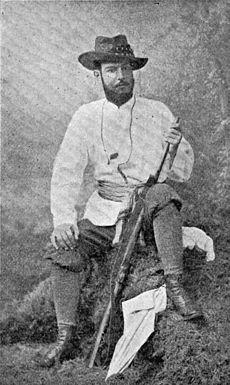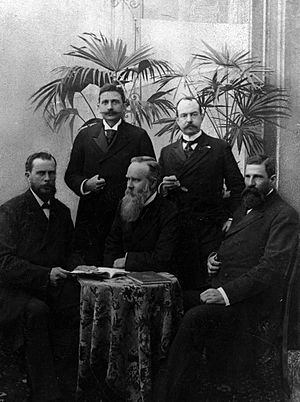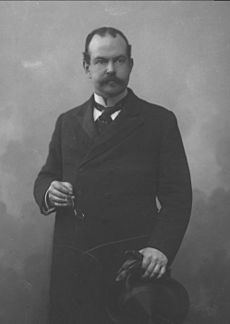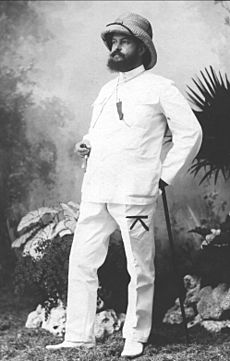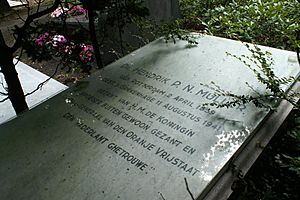Hendrik Pieter Nicolaas Muller facts for kids
Quick facts for kids
Hendrik Muller
|
|
|---|---|
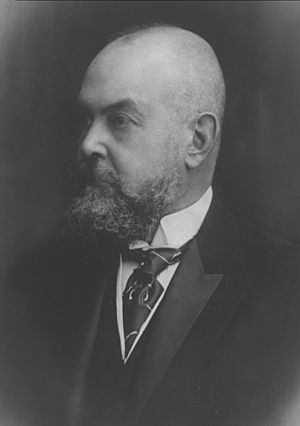 |
|
| Born |
Hendrik Pieter Nicolaas Muller
2 April 1859 Rotterdam, Netherlands
|
| Died | 11 August 1941 (aged 82) The Hague, Netherlands
|
| Occupation | Diplomat, publicist |
Hendrik Pieter Nicolaas Muller (born April 2, 1859 – died August 11, 1941) was a busy Dutch person. He was a businessman, a diplomat, and a writer. He started his career trading with countries in East and West Africa.
When he was in his mid-twenties, he traveled to places like Zanzibar, Mozambique, and South Africa for business. But he was also very interested in different cultures and people, like an ethnographer.
Later, in 1896, he became a consul, and then a consul general, for the Orange Free State. This was a country in South Africa at the time. Muller kept this job during the Second Boer War. He became well-known for representing the Orange Free State in Europe.
After the war ended in 1902, Muller spent years traveling and writing. His travel books became very popular. In 1919, the Dutch government made him an important diplomat, called an envoy, first to Romania and then to Czechoslovakia.
Muller wrote a lot throughout his life. He published over 200 articles, brochures, and books. These were about his travels, South Africa, and Dutch foreign policy. He also became quite wealthy from his investments. He left his money to a special fund to support academic research and cultural heritage.
Contents
Hendrik Muller's Life Story
Early Life and Business Adventures
Hendrik Pieter Nicolaas Muller was born in Rotterdam, Netherlands, on April 2, 1859. He was the second son of Hendrik Muller Szn. His father was a successful businessman who traded with Africa and the Netherlands East Indies. Hendrik's family was well-known in the Netherlands. They had many important people like ministers, professors, and politicians.
Hendrik was expected to follow in his father's footsteps as a businessman. He went to high school in Rotterdam and then studied trade in Germany. After his studies, he gained experience working for companies in England and France.
In 1882, his father called him back to Rotterdam. Hendrik became a manager for a trading company that did business in Mozambique. He traveled to East Africa to visit the company's trading posts. He also toured South Africa, visiting places like Natal and the Orange Free State. When he returned, he gave advice on how to improve the business.
He became a director of the company, which was renamed the East African Company. He also worked for his father's company, which traded in West Africa. In the 1880s, Muller traveled a lot for his businesses. He went to the Congo Conference in Berlin in 1884 and visited Portugal and North Africa. He also became the consul general for Liberia in the Netherlands.
After another business trip to Africa in 1890, he became very ill. During his recovery, he had disagreements with his father and brother. This led him to leave the business world for good in 1891. He decided to start a completely new career.
Exploring Cultures and Geography
Even in the 1880s, Muller had a strong interest in ethnography, which is the study of different cultures. He also enjoyed writing. He gave public talks in the Netherlands and Belgium about his travels to East and South Africa. He also wrote articles that were later put into a book called Zuid-Afrika (South Africa). This made him famous as an expert on the region.
During his travels, Muller collected many cultural objects. In 1892, he published a book about these objects with Johannes François Snelleman. Snelleman was a curator at the National Museum of Ethnology (Netherlands) in Leiden.
Once Muller was no longer running businesses and had enough money, he went to Germany. He studied geography and ethnography at universities there. He earned his doctorate degree in 1894 with high honors. His thesis was about the land and people between the Zambezi and Limpopo rivers. It was considered an important academic work at the time.
Representing the Orange Free State
After his studies, Muller moved to The Hague in the Netherlands. He continued his work as the consul for Liberia and focused on his writing. In 1896, he was appointed consul for the Orange Free State. He got this job because of his writings about South Africa. Later that year, he became the consul general. This was an honorary position, meaning he wasn't paid a salary.
Muller worked hard for the Orange Free State's interests in Europe. He helped the Orange Free State join important international groups like the Universal Postal Union. He also helped them sign agreements with countries like Germany, Switzerland, and the Netherlands. He even looked into practical issues like finding a cure for cattle disease and improving irrigation.
In 1898, Muller traveled to South Africa again. He visited Cape Town, the Orange Free State, and the South African Republic. He became good friends with the new President of the Orange Free State, Marthinus Theunis Steyn.
When he returned to the Netherlands, the political situation in South Africa became very tense. Muller did everything he could to support the Boer Republics. When the South African War (also known as the Boer War) started in October 1899, Muller set up a big effort to help the Orange Free State. He gathered public support in the Netherlands, Germany, and the United States. He also used his contacts with the European press to make sure the Boer cause was reported widely.
His office in The Hague was very busy with diplomatic work. Muller worked with other Dutch organizations that supported the Boers. He also cooperated with Willem Johannes Leyds, the diplomat for the South African Republic. However, Muller and Leyds, both strong personalities, eventually had disagreements. Muller felt that the South African Republic received more attention than the Orange Free State.
In 1901, Muller traveled to the United States himself. He wanted to get support from President Theodore Roosevelt, especially for the women and children in British concentration camps. He also gave many public talks. While in Mexico, he heard the news that the Treaty of Vereeniging had been signed, ending the war. This meant he no longer had his job as consul general. Muller then turned his trip into an expedition and later published a book about it. He continued to be interested in South Africa and the Afrikaners for the rest of his life.
Travels in Asia
Between 1907 and 1909, Muller traveled through Asia. This journey led to several books and articles, including a two-part travel report. He also published a scholarly work about Cambodia and the early Dutch presence in French Indochina. The French government honored him for this work.
Muller's Asian trip covered many places. He visited British India, Ceylon, Burma, Malaysia, and the Philippines. He traveled widely through the Dutch East Indies. He returned home by way of Japan, Korea (where he met the last Korean emperor), Manchuria, China, and Siberia. His visit to Japan made him very interested in that country's economic growth. Back in the Netherlands, he shared his ideas about Japan in speeches and articles.
Dutch Government Work and Diplomacy
In 1914, when World War I began, Muller's career changed again. The Dutch government appointed him to manage one of the main Belgian refugee camps in the Netherlands. He worked with great energy to move the camp to a better location with full supplies. He resigned a year later, feeling he had achieved his goals.
From the 1890s onwards, Muller had often written about how important it was for the Netherlands to have a good consular service. This service would help promote Dutch business interests around the world. He strongly believed that the consular and diplomatic services should be combined and made more professional. He also argued that the Netherlands should play a more active role in international relations.
In 1919, at 60 years old, he had the chance to put his ideas into practice. The Dutch government appointed him as an important diplomat, called an Envoy Extraordinary and Minister Plenipotentiary, to Romania. This country was going through big political and economic changes. The Dutch had important business interests there, especially in oil. Muller stayed in Romania until 1924. Then, he was appointed envoy to Czechoslovakia. In Prague, he also helped with Dutch business matters, such as looking after the interests of the Philips company.
He retired from his diplomatic post in 1932. The Dutch Minister of Foreign Affairs wanted to make room for younger diplomats. Muller chose not to take his pension, which allowed him to keep his diplomatic title until he died.
Preserving Dutch History
From a young age, Muller was interested in Dutch history. He especially admired the great achievements of the Dutch people over the centuries. He supported several projects to honor this history.
He helped fund a statue for Johan de Witt, an important Dutch leader who was murdered in 1672. The statue was unveiled in The Hague on June 12, 1918. It was a national event, attended by the Queen of the Netherlands. The statue stands near where De Witt and his brother were killed. Muller helped write the words engraved on the statue, which describe De Witt as a "perfect Dutchman."
Muller also paid for a plaque to honor the 17th-century Dutch Admiral Maarten Harpertsz. Tromp. This plaque was placed in the new City Hall of his hometown, Rotterdam.
Later Years and Legacy
After 1932, Muller traveled a bit around Europe and lived in his house in The Hague. He stayed involved in cultural and academic activities. He also kept a strong interest in South African affairs. In his final years, he received several honors. He was given an honorary doctorate from the University of South Africa. A statue of him was placed at the University of the Free State.
Muller never had children and was not fully reunited with his family. He left almost all his money to the Hendrik Muller's Vaderlandsch Fonds. This fund supports academic research and cultural heritage. Hendrik P. N. Muller died in his home in The Hague on August 11, 1941. He was buried in a grand ceremony, with the Dutch flag on his coffin. This was a quiet act of defiance against the German Nazi occupation. Many important people attended his funeral, including former government ministers and professors.
During his lifetime, Muller was highly respected for his work. He received many awards from almost all the countries he worked for. He was given high honors from Portugal, Liberia, Romania, Bulgaria, Serbia, Czechoslovakia, and the Netherlands. He was also honored by France, Russia, Vietnam, Belgium, and Japan. A street in Bloemfontein, South Africa, was named after him.
Even though he was highly honored, Muller was known to be a difficult person at times. News reports during and after his life often mentioned his unique personality and strong opinions.
Groups and Societies Muller Joined
- Member of the Royal Geographical Society of Great Britain
- Member and honorary member of the Royal Netherlands Geographical Society
- Member and Director of the Hollandsche Akademie van Wetenschappen
- Member of the Netherlands Literary Society
- Member and board member of the Netherlands–South African Society
Honors and Awards
- From the Netherlands
- Grand Cross in the Order of Orange-Nassau (1935)
- Knight in the Order of the Netherlands Lion
- From other countries
- Grand Commander (Grand Cross) of the Humane Order of African Redemption of Liberia (1897)
- Grand Cordon of the Order of the Rising Sun of Japan
- Grand Cross of the Order of Civil Merit of Bulgaria (1921)
- Grand Cross of the Order of the Crown of Romania (1922)
- Grand Cross of the Order of the Star of Romania (1922)
- Grand Cross of the Order of St Sava of Yugoslavia (1922)
- Grand Cross of the Order of the White Lion of Czechoslovakia (1932)
- Knight Commander of the Humane Order of African Redemption of Liberia (1890)
- Commander of the Legion of Honour of France (1929)
- Knight 1st class of the Order of St Anna of Russia
- Knight 3rd class of the Order of the Dragon of Annam (Vietnam)
- Knight of the Order of Léopold of Belgium
- Knight of the Order of Christ of Portugal
What He Left Behind
The Dr Hendrik Muller Prize for Behavioural and Social Sciences is named after Hendrik Muller. This important prize is given every two years by the Royal Netherlands Academy of Arts and Sciences. It honors a researcher who has made valuable contributions to the study of human behavior and society.
 | Shirley Ann Jackson |
 | Garett Morgan |
 | J. Ernest Wilkins Jr. |
 | Elijah McCoy |


